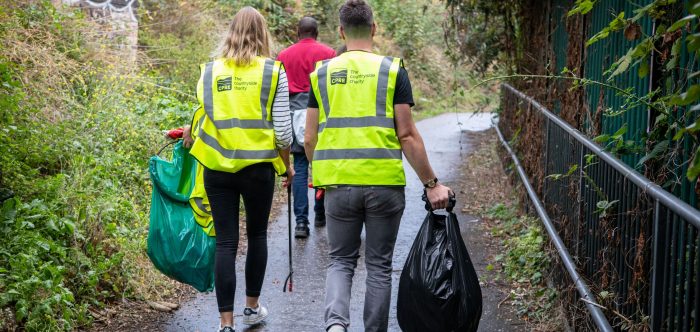Roads and highways

Highways England and local authorities are responsible for clearing litter from roads and motorways.
Roads: Clearing of litter and refuse
The responsibility of the removal of litter, refuse and detritus from roads falls to Highways England and local authorities.
Motorways
Highways England is the government company charged with operating, maintaining and improving England’s motorways and major A roads.
The strategic road network (SRN) totals around 4,300 miles, and is split into seven regions in England. Highways England is responsible to maintain and improve the network, which includes undertaking road clearing and cleaning of the SRN, due to the transfer of responsibility from the Secretary of State for Transport.
Highways England, however, is not an enforcement organisation, and so is unable to enforce the criminal offence of littering. Local authorities are required to enforce litter offences on roads in their areas (PDF 6.39 MB).
Other roads
Section 86(9) of the EPA 1990 designates responsibility for cleaning other roads to the district and borough councils (in Greater London to the council of the London borough or the the City of London; in Wales to the county or borough council and for the Isles of Scilly to the council).
Many busy ‘trunk roads’ (generally known as ‘A’ roads or ‘all-purpose trunk roads’) are therefore the responsibility of the local (district or borough) authority as well as all minor roads.
Most council websites list a cleaning schedule for their areas.
Some, but very few, of the larger roads are the responsibility of the county council.
Legislation
UK legislation applicable to the clearance and/or enforcement against littering of roads, highways and verges:
- Environmental Protection Act 1990
- Clean Neighbourhoods and Environment Act 2005
- Anti-Social Behaviour, Crime and Policing Act 2014
- The Littering from Vehicles Outside London (Keepers: Civil Penalties) Regulations 2018. The litter authority ‘must have reason to believe that a littering offence has been committed in respect of the vehicle on the authority’s land’. The fixed penalty tariff is specified by the local authority, if unspecified, it is £100. If the fine remains unpaid within the penalty payment period, it increases by 100%.
- Other legislation: 2010 Waste (Wales) Measure, 2015 Wellbeing of Future Generations (Wales) Act
Responsibility for clearance and enforcement
Councils: Section 89(1) of the EPA 1990 places a duty on certain bodies to ensure that land, for which they are responsible, is, as far as practicable, kept clear of litter and refuse. There are many bodies listed including, but not limited to, county, district, borough and parish councils.
- County councils: Although there is a duty on county councils in practice, generally, district and borough councils clear litter from relevant land.
- District and borough councils: District and borough councils clear litter from relevant land including highways: A-roads, trunk roads, minor roads and housing estate roads. Under section 87 of the EPA 1990, district and borough councils are also able to issue FPNs for littering. Section 88A of the EPA has been brought in to force in England so that where litter is dropped from a car, the registered keeper of that vehicle can be fined – there is no need to establish exactly who the culprit is. As the exact offender may not be established this attracts the lesser charge of a ‘civil penalty’ not a criminal charge. The registered keeper/owner of the vehicle would receive a Penalty Charge Notice (PCN) – this is not applicable to taxis.
- Parish councils: Under Section 88(9)(f) of the EPA 1990, a parish council is recognised as a ‘litter authority’ which can issue FPNs for littering. In practice, many parish councils are unaware that they have this power, or have insufficient resources to issue FPNs. However, under the Environmental Offences (Fixed Penalties) (Miscellaneous Provisions) Regulations 2007 anyone authorised by a parish council to issue FPNs must have completed a course by a -provider approved by the secretary of state (typically such courses are provided by the Keep Britain Tidy Network).
Private landowners: There are few duties on private landowners to clear litter from private roads unless restrictive covenants apply. If a private property allows sufficient accumulation of litter that it becomes undesirable or a health hazard to others, a Community Protection Notice can be issued under the Anti-Social Crime and Policing Act 2014.
Highways England: Responsibility to ensure motorways and some large A-roads are cleared of litter lies with Highways England. However, it does not have enforcement powers against littering from vehicles; that lies with the relevant local authority in whose district the road falls.
Environment Agency: No specific duties to clear litter.
Volunteers: No legal obligation on volunteers to clear litter and they do not have any enforcement powers. Voluntary litter-picking on roads and/or verges is not encouraged by responsible authorities due to health and safety concerns.






